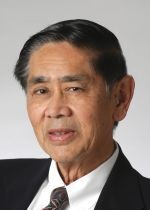- unknown (b.)
Bio/Description
He received his B.S., A. M., and Ph.D. degrees in Electrical Engineering from Princeton University in 1955, 1958, and 1959, respectively. Prior to coming to Berkeley, he was an NSF Postdoctoral Fellow at University of Cambridge (1959-1960), and a researcher at IBM Research Center in Yorktown, New York (1960-1962). He joined the faculty of the EECS Department in 1962, where he pursued his research interests in database management systems, optimization algorithms, stochastic processes, and neural networks. From 1985-1989, he served as Department Chair, during which time he led the department through its greatest period of growth to become the largest academic department on the Berkeley campus and one of the highest ranked departments in its field. He retired from the Department in 1994 as Professor Emeritus. In 2004, the Wireless Foundation was established in Cory Hall upon completion of the Eugene and Joan C. Wong Center for Communications Research. It is noteworthy that his distinguished career includes significant contributions in equal measure to academia, business, and public service. As an academician and educator, he authored or co-authored over 100 scholarly articles and published four books, while mentoring a number of students and supervising over 20 dissertations. His business acumen and achievements rival his academic accomplishments. In 1980 he co-founded (with Michael Stonebraker and Lawrence A. Rowe) Relational Technology, Inc.; later renamed the INGRES Corporation, which was a leading provider of database software products. While in Hong Kong from 1994-1996, he was instrumental in building an Internet backbone for Asia, first as CEO of SuperNet, Ltd., and then as founder of the Asia Internet Holding Company. From 1998-2005, he was variously a director, chief scientist, and CEO of Versata, Inc., a public software company serving the distributed enterprise applications market. Besides his academic and entrepreneurial attainments, he has a distinguished record of national and international public service. From 1990-1993 he was the Associate Director of the Office of Science and Technology Policy, Executive Office of the President, under George H. Bush, where he played a leading role in efforts that led to the U.S.-Japan cooperative program in optoelectronics and to the federal initiatives on High Performance Computing and Communications and on Advanced Manufacturing Technology. While there he also contributed to the enacted version of the High Performance Computing Act of 1991. From 1994-1996, he was Vice President for Research and Development for Hong Kong University of Science and Technology, where he developed innovative programs in technology transfer and commercialization. From 1998-2000, he was an assistant director at NSF for engineering, where he inaugurated major initiatives in microsystems, information technology, nanotechnology, service-sector engineering, and biotechnology. In addition, he has served on numerous advisory committees of national and international organizations (NAE; NRC; NATO; Chairman of the Council of Advisors on Innovation and Technology, Office of the Chief Executive, Hong Kong; and the Science and Technology Advisory Group, Office of the Prime Minister of Taiwan). Most recently, he served as Interim Director of Information and Communication Technologies for Science Foundation Ireland. He is a member and former Councilor for the National Academy of Engineering; a Fellow of the American Academy of Arts and Science; a Lifetime Member of the IEEE; a Member of the ACM; and an Academician of the Academia Sinica (Taiwan). He received an ACM Software System Award in 1988 for his work on INGRES, and was awarded the 2005 IEEE Founders Medal, with the apt citation: "For leadership in national and international engineering research and technology policy, for pioneering contributions in relational databases."
-
Gender:
Male -
Noted For:
Instrumental in building an Internet backbone for Asia; contributor to relational database management and inaugurated major initiatives in microsystems, information technology, nanotechnology, service-sector engineering, and biotechnology -
Category of Achievement:
-
More Info:


